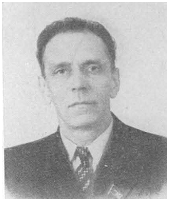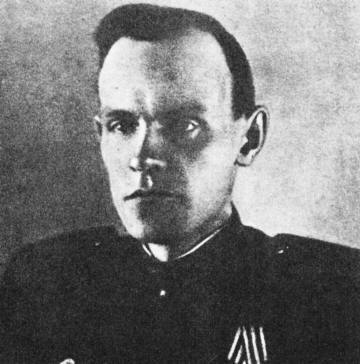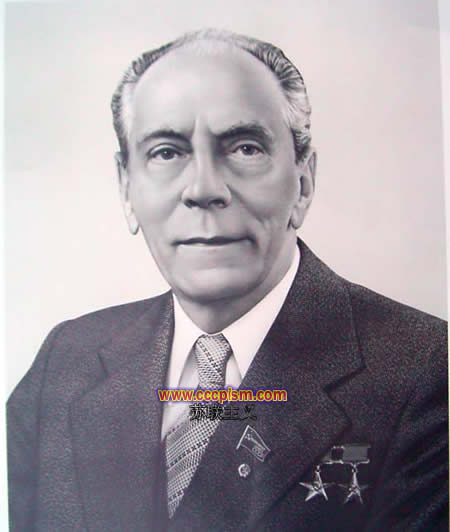Arvīds Pelše
Arvīds Pelse (Russian:. . Арвид Янович Пельше, Arwid Janowitsch Pelsche, born 26 Januarjul / February 7 1899greg in Zālīte at Iecava, Courland Governorate, † 29 May 1983; Moscow) was a Soviet Latvian politicians.
Life
Occupation, training and career
Pelsche was the son of a peasant family in the Latvian Bauska district in the region Semgallen. As a worker he was in the machine - active workshops in Riga, Vitebsk and in Kharkov and Petrograd to 1917 and then as a docker in Arkhangelsk.
Since 1915 the Bolshevik Pelsche was a member of the Social Democratic Workers' Party of Russia of the future Communist Party of the Soviet Union ( CPSU ). In 1916 he met Lenin in Switzerland. The party of Arkhangelsk sent him to the VI. Congress from 1917 to Petrograd. So Pelsche was then a member of the Petrograd Soviet at the time of the October Revolution. In 1918, he worked briefly for the Cheka only to be ordered by Lenin to Latvia, there to organize the revolution. 1919 accompanied the Red Army. After the defeat of the communists in Latvia, he returned to Russia to again serve as political commissar and political teacher until 1929 in the Red Army. After that he was Instrukteuer at the Central Party School of the NKVD. From 1931 to 1933 his political education was deepened by a study at the Historical Institute in Moscow. From 1933 to 1937 he was deputy of the Commission on the state farms. From 1937 to 1940 he taught History Marxism at a Teacher Training Institute in Moscow.
In the centers of power
His loyalty to the Communist Party ( CP) let him ascend to the highest offices. Since 1941, he was firmly integrated in the party apparatus of the Latvian Communist Party and that from 1941 to 1959 as secretary of the Central Committee of the Communist Party of the Latvian SSR. From November 1959 to April 1966 he was then First Secretary of the Latvian Party and from 1961 a member of the Central Committee of the CPSU. As head of the Commission Pelsche he examined from 1963 to 1966 the cause of death of Stalin confidant Sergei Kirov in 1934.
Pelsche was a representative for a collective leadership style in the bodies of the party and for the strengthening of the influence of the Central Committee. So the Central Committee elected the already 67 -year-old as one of only few non - Slavs and a full member in the highest political body of the USSR, the Politburo of the Communist Party of the Soviet Union ( CPSU ) and, in the period of 8 April 1966 to 29 May 1983. Between 1966 and 1983 he was also Chairman of the control Committee of the Central Committee of the CPSU. However, in the center of power, he had no special significance.
Although he was of Latvian origin, he stood for his blunt rejection of a more independent Latvia and the fight against " nationalist tendencies ", which also included the prohibition of local holidays and customs, with his compatriots only to a small reputation.
Pelsche wrote several books on the history of the CPSU and the revolutionary development in Latvia. He was married to the sister of Mikhail Andreyevich Suslov Poltbüromitgliedes.
Honors
- Twice awarded the title of Hero of Socialist Labor and medals.
- Six times he was awarded the Order of Lenin.
- He received the Order of the October Revolution and other awards.
- The Polytechnic Institute of Riga received after his death his name as an additive.
- His ashes were buried after a state funeral at the Kremlin wall in Moscow.










